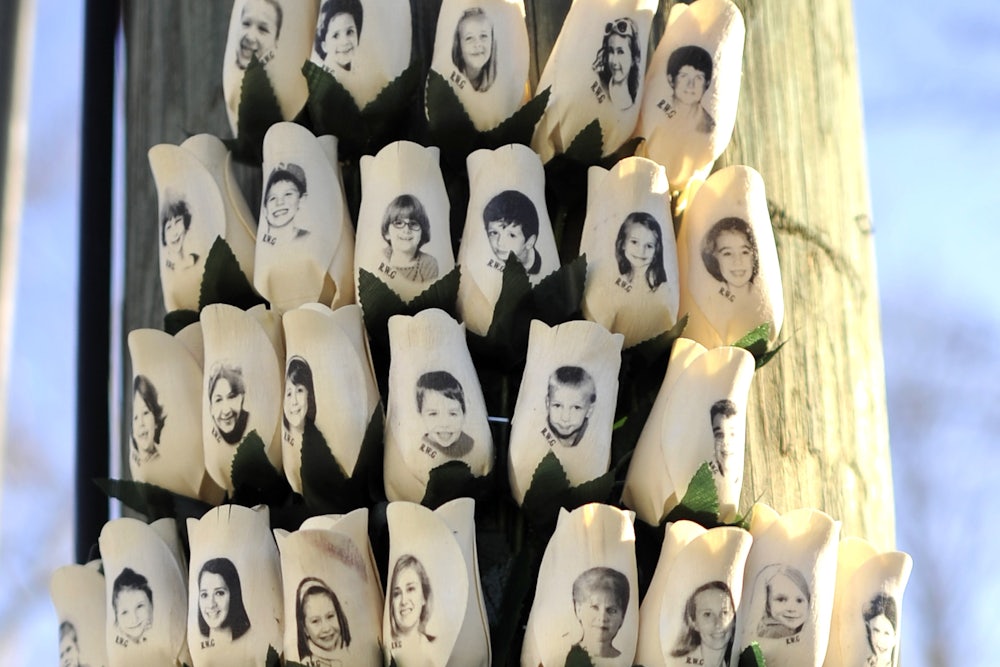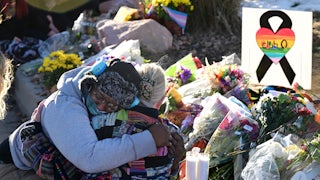On December 14, 2012, third grade student Bear Nikitchyuk had been sent to deliver his class’s attendance roster to the front office at Sandy Hook Elementary in Newtown, Connecticut. While he was there, a gunman shot out the windows behind him and entered the school. Bear fled and survived the shooting—teacher Abbey Clements pulled him out of the hallway and into her classroom—but the trauma of that day still affects him now, at 18 years old. For the Nikitchyuk family, like so many other Newtown families, that day was just the beginning of a struggle that has lasted a decade, and may never end.
“We were not politically engaged before this,” explained Erin Nikitchyuk, Bear’s mother. “After the shooting, we just kind of cocooned for a while. One day my husband got up and said, ‘You know what? I’m mad and I’m gonna do something about it.’ And less than 48 hours later he was at the White House.”
Years of political advocacy for gun violence prevention, though, have left the family feeling drained. “It can be very demoralizing to go so many times and speak to so many people, and sometimes speak to the same people, and to have people say, ‘I’m gonna work really hard on this,’ and then to have nothing happen,” Erin said.
That sentiment—that little or nothing has changed—was voiced repeatedly this May, after a gunman attacked Robb Elementary School in Uvalde, Texas, in what sounded on news reports almost like a rebroadcast of the Sandy Hook shooting. The weapons used in Texas and Connecticut were virtually identical, and the federal laws that regulate them were virtually unchanged too. It is still legal, under federal law, for a private individual to sell an AR-15 to a stranger in a parking lot without knowing anything at all about the buyer (even his name) and without making any record of the sale. It’s still legal, under federal law, to buy thousands of rounds of ammunition online and have them mailed to your doorstep. Gun ownership is substantially higher now than it was a decade ago, as are gun deaths.
But federal legislation is only one metric by which progress toward gun violence prevention can be assessed. The legacy of a decade of activism that Newtown’s tragedy provoked can be best observed in state legislation and in precedent-shattering civil litigation.
Matt Blumenthal was still a student in law school in 2012 when he heard the news of the Sandy Hook attack. “I remember where I was,” he told me. “I remember seeing the TV in one of the common rooms and just being shocked and aghast.” Now a Connecticut state representative, Blumenthal has worked to tighten state regulation of firearms, co-authoring a bill to ban “ghost guns” and 3D printed guns that became law in 2019.
“Even without federal legislation, states can make a big difference on their own,” Blumenthal, whose father is Senator Richard Blumenthal, said. “Not only by passing laws within their own borders, to protect their own residents, but also as examples to each other as laboratories of democracy to show the most effective gun violence prevention policies. I think it’s fair to say that Connecticut has been a leader on gun violence prevention legislation.” Blumenthal listed the various reforms the state has implemented since Sandy Hook, which include a ban on assault rifles, a ban on high capacity magazines, new laws requiring the safe storage of firearms, and updates to the state’s extreme risk protective orders, also called “red flag” laws.
Compared to previous legislative sessions, the number of gun-related bills introduced in statehouses nationwide more than doubled after Sandy Hook. Not all of those bills had the same intention, of course–while states like Connecticut, New York, Colorado, and Oregon passed sweeping new gun regulations, red states simultaneously passed a succession of bills to expand gun rights, through proposals for campus carry, open carry, and so-called “constitutional carry” (the right to carry guns in public with no license). The divergence has resulted in a significant disparity in gun violence from state to state.
“It’s made a big difference for Connecticut,” Blumenthal said. “We’ve seen rates of violent crime and suicide by gun decrease over the past 10 years. Connecticut is one of the safest states in the country with one of the lowest violent crime rates, and I think our strong gun laws play a significant role in that outcome.”
Recently, Blumenthal has come to know several of the Sandy Hook family members as clients in private practice. Through his work as an attorney at Koskoff, Koskoff, and Bieder, Blumenthal assisted colleagues in a lawsuit against gunmaker Remington, and then took a more prominent role in a later suit against conspiracy theorist Alex Jones that resulted in a $1.4 billion award for the plaintiffs.*
For years, the common wisdom has been that gun manufacturers and retailers simply couldn’t be sued. That’s thanks to the Protection of Lawful Commerce in Arms Act, signed by George W. Bush in 2005, which gives the industry broad protections from liability when their products are used in crimes. Blumenthal says the PLCAA “really incentivizes some of the worst behavior we’ve seen out there by firearms companies, because they know that they have this extraordinarily broad immunity. There was this conventional wisdom that PLCAA was impermeable. But one of the exceptions to the immunity is for claims related to marketing of firearms. Based on some really creative and effective lawyering by some of my colleagues, the case was litigated in such a way as to fit into that exception.”
Remington subsidiary Bushmaster had marketed its XM15E2S rifle (an AR-15–style weapon) with the phrase “Consider your man card reissued,” a message that plaintiffs said specifically targeted insecure and unstable young men like Adam Lanza, the Sandy Hook shooter. That argument won them a $73 million settlement.
That substantial award, and Remington’s concurrent bankruptcy, reverberated across the industry, and among activist communities. “I think it shows that the gun industry is not invulnerable—it shows that they’re very vulnerable,” said Jeremy Stein, executive director of CT Against Gun Violence. (Under Stein’s predecessor, the group authored an amicus brief in the trial.) “I’m a firm believer that a lot of motivation, when you’re trying to change the culture of America, often times can be influenced by liability. I think liability is a huge motivator for Americans. What this tells us is that they can be held responsible.”
The money, significant though it might be, represents at best a Pyrrhic victory for the families that brought the suit. “There’s no amount of money that could possibly be paid to these families that could make them whole again,” Stein said.
Perhaps, though, the most consequential upshot of the tragedy in Newtown is yet to be realized. Ten years on, the Sandy Hook generation is only just entering politics. (The victims of Sandy Hook would today be just about old enough to vote.) Po Kim Murray, who co-founded the Newtown Action Alliance after she discovered her neighbor had perpetrated the attack, points to the emergence of gun violence prevention candidates as hopeful evidence of change still to come. As an example, she points to Maxwell Frost, the first Gen Z candidate elected to Congress. “He ran unapologetically on gun violence prevention,” Murray said. “These young people who have been impacted by gun violence or influenced by gun violence will run for Congress or other elected seats, and they will win.”
That’s a sentiment echoed by Erin Nikitchyuk, who for years mentored the Junior Newtown Action Alliance. “The kids,” she said, “they’re ready to go. ‘Oh, you mean we should knock on doors? Let’s go knock on doors.’”
The Nikitchyuks will soon be moving away from Sandy Hook. Over the years, many of Erin’s friends and co-workers who were also affected by the shooting have left town. The school itself has been demolished and rebuilt in a new location. The headquarters of the National Shooting Sports Foundation, located coincidentally in Newtown, has recently closed its doors. A large green banner guards the entrance to an empty parking lot, “Now Leasing.”
* This article has been updated to clarify Blumenthal’s role in the Remington lawsuit.






